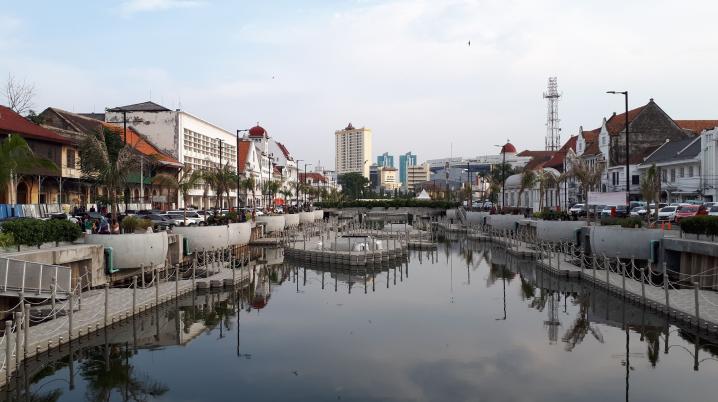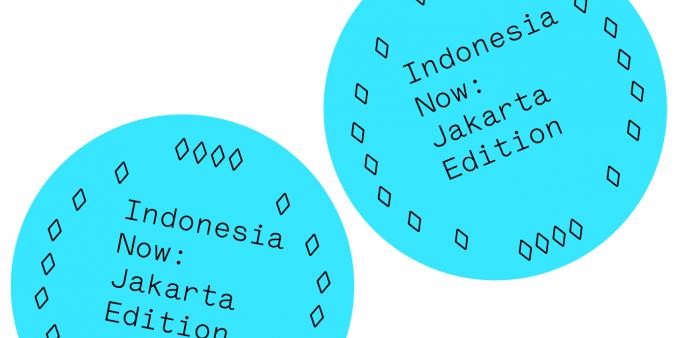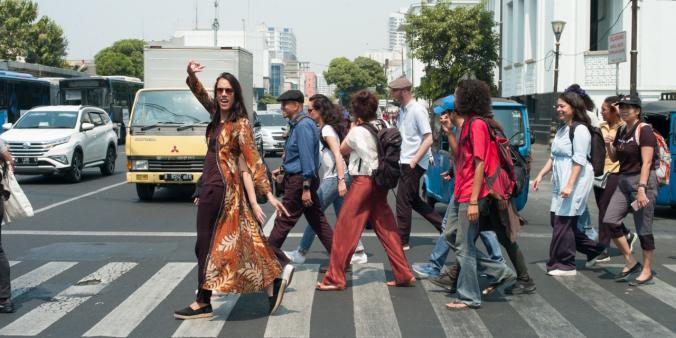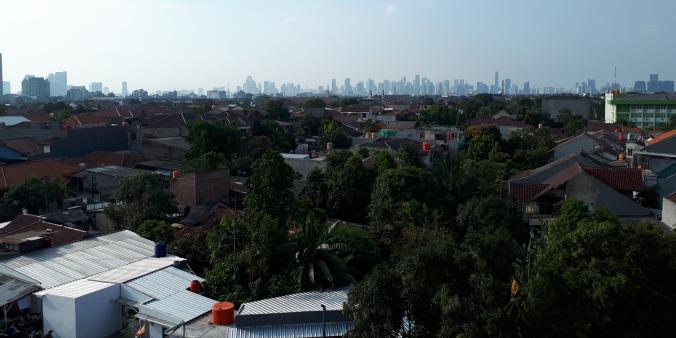
Conference Indonesia Now 2019
Indonesia Now 2019
This sequel to previous successful Indonesia Now events in 2015 and 2017 will focus on future-oriented cooperation between Indonesia and the Netherlands. In so doing, the event will go beyond describing the close ties and existing examples of cooperation between the Netherlands and Indonesia. At Indonesia Now 2019, academics, civil society actors, policy makers, companies and artists will look into the future to explore possible avenues for cooperation between the countries in the years to come.
Practical information
Date: Tuesday 12 November 2019
Time: 09:00 to 17:15, followed by a networking opportunity
Location: Vlaams Cultuurhuis de Brakke Grond, Nes 45, 1012 KD Amsterdam
Language: English
Entrance: free, but registration is required. -- Please note that registration is now closed.
Programme
The conference will consist of a full-day programme. The morning and afternoon programme will both be kicked off by a plenary session. There will be three rounds of different break-out sessions on cultural, political, economic, social and educational topics. Please note the programme may be subject to change.
The registration is from 9:00 - 9:30, the conference starts at 9:30 with the first Plenary Session.
Plenary sessions
Plenary Session 1
- Cees de Graaff, director at DutchCulture.
- Max Valstar, head South and Southeast Asia and Oceania Division at Netherlands Ministry of Foreign Affairs.
- H.E. I Gusti Agung Wesaka Puja, ambassador of the Republic of Indonesia to the Netherlands.
- Cultural Performance by poet, musician and theatre performer Robin Block and writer and performer Felix K. Nesi.
Plenary Session 2
- Leila Chudori (keynote), author, journalist and screenwriter for film and television.
- Tita Larasati (keynote), chair of Bandung Creative City Forum.
Breakout sessions
- Returning Art by Ministry of Education, Culture and Science and DutchCulture
-
Concerning collections with a colonial background. Discourses and dialogues in academic research and cultural politics.
Colonial heritage, the history of slavery and collections with a colonial background are important topics in civil society and cultural politics today. We will be reflecting on current political and academic discourses regarding collections with colonial contexts, with a particular focus on Dutch–Indonesian relations and our two countries’ shared history. Provenance research, the shifting meaning of concepts in the post-colonial period and inclusive intercultural dialogue about collections with a colonial background are urgent topics in contemporary academic research, as well as in cultural politics. Exploring these issues is crucial for a deeper understanding of collections and exhibition practices, as well as for our ability to orientate our shared and contested histories and the production of cultural memory in both Indonesia and the Netherlands. At times collections can confront us with unwelcome truths about our past, while simultaneously offering us ways to access new narratives and different perspectives on shared and contested histories.
From this perspective, we will be reflecting in particular on intercultural dialogues between communities and institutions in the Netherlands and Indonesia. What best practices and innovative concepts exist for facilitating and stimulating intercultural dialogue between communities, public institutions and collections? In the context of Indonesia Now 2019, we want to discuss these topics with you and reflect on Dutch-Indonesian relations, through academic discourses and cultural dialogue centred on collections with a colonial background. We want to explore possible paths for cooperation between our countries, communities and institutions in the years to come.
Speakers: Dr Mirjam Hoijtink (University of Amsterdam / Leiden University), Aminudin T.H. Siregar (Leiden University / Faculty of Art and Design, Institut Teknologi Bandung) and Dr Robert Verhoogt (Ministry of Education, Culture and Science).
- Countering Violent Extremism by University of Amsterdam
-
Security in Indonesia’s is provided both by officials and by a wide variety of informal actors, ranging from neighbourhood watches to nationwide ‘societal organisations’ (organisasi kemasyarakatan, or ormas) which seek to uphold the integrity of the state and the values of Pancasila (the country’s foundational political philosophy). In recent years, this mix has been put to the test. While the government decided to ban a number of hardline religious organisations for not adhering to Pancasila, citizens’ organisations have increasingly taken it upon themselves to monitor hardline groups’ activities, further dialogue and occasionally engage in preventive actions. While Indonesia’s policy on dealing with religious intolerance is rooted in governmental action, it is also strongly dependent on societal dialogue. In the Netherlands tensions between Islamic groups and anti-Islamic opponents have become recurrent and increasingly visible elements in the public sphere. Unlike in Indonesia, few societal forces exist that can play a mediating role by fostering dialogue and broader societal engagement. As a result, dealing with the issue falls primarily to the government.
This raises several questions. What is the impact of these different policies on how we engage with religious extremism? What can each country learn from the other? Can best practices be identified on both sides?
Speakers: Laurens Bakker (researcher University of Amsterdam), Max de Bruijn (writer and international security analyst at the Ministry of Justice and Security), Karim (PhD candidate at the University of Amsterdam) and Siti Darojatul Aliah (founder and Director of Society against Radicalism and Violent Extremism).
- The Private Sector and the Rule of Law by Center for International Legal Cooperation (CILC) and the International Development Law Organization (IDLO)
-
Indonesia is in the midst of a rapid economic transformation. By 2030 it could be the seventh-largest economy in the world. At the same time, it is lagging behind when it comes to the SDGs; as of 2018 it ranked 99th in the world. This is why it is vital to promote sustainable economic development and strengthen legal frameworks. This will enhance legal certainty for the private sector and make it easier to do business in the country while improving the protection of human rights and economically empowering local communities. Thanks to historically strong trade relations between Indonesia and the Netherlands, this will directly benefit the Dutch private sector too (the Netherlands is the second-largest EU importer of palm oil from Indonesia). The economic boom in Indonesia is posing a number of serious societal challenges. There are an alarming number of conflicts between businesses and local communities, often revolving around land rights, access to natural resources and labour conditions. There is also an urgent need to improve the existing legal framework, with due attention to independent dispute resolution facilities and informal third-party mediation systems. Businesses are increasingly expected to use their leverage to improve the government’s human rights protection and strengthen the rule of law.
This breakout session will set the stage for an informal discussion between stakeholders on how to engage Dutch businesses in dialogue with the Indonesian government on strengthening the regulatory framework to a) improve the investment climate and b) enhance adherence to the rule of law in order and better protect human rights in Indonesia. The session will focus on agribusiness (including palm oil), renewable energy and the financial sector.
Speakers: Santy Kouwagam (researcher Van Vollenhoven Institute for Law, Governance and Society), Mark van Dorp (consultant on responsible business and sustainable economic development), Ningrum Sirait (professor at the University of Sumatera Utara) and Prahesti Pandanwangi (director law at Indonesian Ministry of National Development and Planning).
- Youth & Social Change by Indonesia Nederland Youth Society and the Leiden branch of PPI, the Indonesian Student Association
-
Discussions about future cooperation between Indonesia and the Netherlands are inextricably linked to the debate about the role played by Dutch and Indonesian young people in relations between the two countries. With their long shared history, Indonesia and the Netherlands work together closely in a variety of areas: the economy, the rule of law, education and culture – all of which contribute to the achievement of the SDGs.
Academic exchanges between Indonesia and the Netherlands have been taking place for decades. In the future, young Dutch and Indonesian citizens will play an extremely important role in building on what the present generation has created. There are currently around 15 Indonesian student organisations active in the Netherlands. Dutch and Indonesian young people engage with each other, sharing experiences and identifying the similarities stemming from their shared history.
This enthusiastic exchange of experiences has resulted in a wealth of knowledge and perspectives, but how can we harness this to create sustainable future cooperation? And to what extent can young people help enhance relations between Indonesia and the Netherlands? This session will discuss the role young people can play, identifying existing youth initiatives that seek to foster cooperation between Indonesia and the Netherlands. The aim of this session is to spark interest and inspire Dutch and Indonesian students to take action and create a sustainable future bilateral relationship.
Speakers: Yanti Kusumanto (researcher, convenor and activist), Rennie Roos (founder Asia Consulting, Indonesia Nederland Youth Society and Creating Vibes), Lara Peeters (entrepreneur of brand LARAS) and Ari Purnama (practioner, educator and researcher).
- Jakarta, the 'former' capital by Leiden University, International Institute for Asian Studies and Cultural Heritage Agency of the Netherlands
-
Jakarta: soon-to-be ‘former’ capital of Indonesia? Three perspectives on the capital relocation plan.
This session is a collaboration between the International Institute for Asian Studies (IIAS), Leiden University and the Dutch Cultural Heritage Agency (RCE). It analyses the Indonesian government’s plans to relocate the national capital from Jakarta from the vantage point of Jakarta as ‘soon-to-be former capital’ of Indonesia. It does so from the perspectives of history, political analysis and heritage.
Speakers: David Henley (professor Leiden University), Adrian Perkasa (historian Universitas Airlangga and PhD candidate Leiden University), Jean-Paul Corten (senior policy officer RCE) and Paul Rabé (head of city programme International Institute of Asian Studies).
- Shared Heritage by TiMe and Cultural Heritage Agency of the Netherlands
-
Creative Perspectives on Shared Cultural Heritage.
During this session the Cultural Heritage Agency will focus on the development of sustainable crossovers between the cultural heritage domain and the creative industry, both in Indonesia and in the Netherlands. Cultural heritage and the creative industry are natural partners in their shared pursuit of innovation and empowerment, with regard to product development, audience-building, education and learning, preservation and reuse of traditional or indigenous products and skills. This not only benefits major urban creative hubs, but also represents opportunities for the economic and cultural development of rural areas. During the session we hope to discuss new, creative perspectives on shared heritage, which can sometimes be rather outdated. We actively encourage attendees to participate in this session as we search for new connections between the two domains and two countries.
Speakers: Ayos Purwoaji (curator Surabaya Contemprorary Heritage Council), Rifandi Nugroho (curator, writer and editor-in-chief Arsitektur in Indonesia), Yolanda Ezendam (head of collections Dutch Cultural Heritage Agency), Remco Vermeulen (advisor Indonesia DutchCulture) and Max Meijer (consultant and trainer TiMe and Dutch Shared Cultural Heritage Programme).
- Online Disinformation in Election Times by Ministry of Foreign Affairs
-
Although disinformation is not a new phenomenon, it has gained renewed attention in recent years. New media makes it possible to disseminate and promote online disinformation campaigns at an unprecedented speed and scale. This can be particularly relevant in the context of national or regional elections, where disinformation can polarise debates and hamper citizens’ ability to take informed decisions.
Over the past year, elections were held in both the Netherlands and Indonesia. In the Netherlands, millions of people cast their vote in the provincial elections in March and in the European Parliament election in May 2019. In Indonesia, over 190 million eligible voters were able to elect their president and parliament in April 2019. In the run-up to their respective elections both countries stepped up efforts to address online disinformation and support critical consumption of media and information. The Netherlands launched a ‘stay critical, stay curious’ campaign, and the Indonesian Ministry of Communications and Informatics started giving weekly briefings ahead of the elections to distinguish facts from disinformation.
As Indonesia and the Netherlands face similar challenges, what can we learn from each other’s experiences and approach going forward? How can we support the critical consumption of media and information? And what role can the government, citizens, NGOs and companies play in all this? This panel will be examining the role of disinformation in elections in the Netherlands and Indonesia and look into the challenges and opportunities that lie ahead.
Speakers: Harry Sufehmi (IT consultant Indoensian Election Commission), Annelies Langelaar (programme coordinator South Asia and Indonesia Free Press Unlimited) and Puck Gorrissen (policy officer Dutch Ministry of the Interior and Kingdom Relations).
- Sustainable Design by Dutch Design Foundation and DutchCulture
-
What if... we could design a sustainable society together?
In this session, Studio Joes + Manon (NL) and Studio pppooolll (IND) will take you on a journey, exploring the results of their investigations into how participatory design can be used to build a fair and democratic city. The studios have been collaborating on research aimed to reposition participatory design as an approach that encourages a critical, emancipatory and sustainable process. To do so, Joes + Manon and pppooolll developed a framework (X by X) and tools for designers to facilitate public design workshops that foster a sense of ownership and urgency. Joes + Manon will use the process and outcomes of the X by X project to illustrate the opportunities and challenges of working with participatory and co-design processes in this context. pppooolll will share its perspective on this intercultural collaboration digitally. How have they profited from each other’s expertise and experience? What if Lab: the sustainable society is a project initiated by the Dutch Design Foundation and developed in collaboration with Erasmus House Jakarta, DutchCulture and BEKRAF. As part of the programme, five Indonesian designers teamed up with designers from the Netherlands active in the same field of work. These teams then collaborated on new solutions for some of the complex challenges facing Indonesia today: sustainable education, clean air, bio-based materials and resilient neighbourhoods. The session will be introduced by Dries van Wagenberg (Dutch Design Foundation) and closed by Tita Larasati (Bandung Creative City Forum).
Speakers: Joes + Manon (social design studio), Kamil Muhammed (director pppooolll design studio), Dries van Wagenberg (programme manager 'What if Lab') and Tita Larasati (lecturer and researcher Institut Teknologi Bandung).
- Knowledge Diplomacy by Nuffic
-
Knowledge diplomacy has been defined as the role of international higher education, research and innovation in building/strengthening relations between and among countries. Education and research already plays an important role in bilateral relations between the Netherlands and Indonesia. Education collaboration encompasses higher education as well as projects at the level of technical and vocational education and training (TVET). Dutch development aid has funded much of this collaboration. As our relationship transitions from aid to trade, education, knowledge and culture is becoming even more important as a means of projecting and sustaining the Netherland’s soft power via knowledge diplomacy. Continued knowledge collaboration requires new forms of partnerships and co-funding models with the Indonesian government, private sector and other stakeholders.
This session explores the challenges and opportunities of knowledge collaboration in this new context. It will be based on a case study that draws on the experiences of the Dutch Training and Exposure Programme (DUTEP), a collaboration between Jakarta and Rotterdam. DUTEP works to improve urban water management in Jakarta by training Jakarta Capital City government staff in Rotterdam. It is a good example of a new style of bilateral cooperation, in which higher education, the private sector and government work closely together. The winner of the Jakarta Capital City Water Challenge for DUTEP graduates, held in October 2019, will be awarded a ticket to Indonesia Now to share their experiences. Representatives from the private sector and public institutions will also attend.
Speakers: Shirley van Maren (member of the board Nuffic), Sebastiaan den Bak (head of international policy Netherlands Organisation for Scientific Research), Delphine (PhD candidate Utrecht University), Wendele van der Wielen (policymaker, senior project advisor RVO.nl), Max Valstar (head South and Southeast Asia and Oceania Division at Netherlands Ministry of Foreign Affairs) and the winner of the DUTEP Water Challenge (TBA).
- Cooperation in Film Productions by Netherlands Film Fund
-
Cooperation in film productions, international co-production policy, current situation in the Netherlands and Indonesia and a case study: Film production The East.
The Netherlands Film Fund is the national agency responsible for supporting film production and film-related activities in the Netherlands. Its focus is on developing and strengthening Dutch cinema and film culture, both domestically and internationally. The Fund has film co-production treaties and funding schemes with a select number of countries. In this session representatives of the Film Fund will speak about the principles underlying the various support schemes, with particular attention to relations between the Netherlands and Indonesia. A PowerPoint presentation will showcase current and past Indonesia-related works. Sander Verdonk, managing partner of New Amsterdam Film Company, will talk about Jim Taihuttu’s wartime drama The East (in production) which takes place during the Indonesian War of Independence in 1946.
Speakers: Peggy Driessen-Bussink (Production Manager Dutch minority co-productions Netherlands Film Fund), Ellis Driessen (Consultant International Department Netherlands Film Fund) and Sander Verdonk (Managing Partner New Amsterdam).
- Jokowi's second term: Indonesia and the Netherlands 2019 - 2024 by Ministry of Foreign Affairs
-
The Netherlands and Indonesia are important strategic partners that cooperate in many areas including security, economic development, academic exchanges, culture and human rights. This year, the ties between the two countries were further strengthened during Prime Minister Mark Rutte’s visit to Indonesia on 7 October 2019. This visit underscored Mr Rutte and President Widodo’s commitment to continuing and stepping up their good bilateral cooperation in the years to come.
But what will bilateral cooperation between Indonesia and the Netherlands look like in the coming years? On 20 October, Joko Widodo will be inaugurated for a second term. In the next five years, Joko Widodo (or ‘Jokowi’ as he is popularly known) and his government aim to implement his ‘Nawacita’ or ‘Nine Ideals’ strategic plan, investing heavily in both infrastructure and human capital. What will be the key elements of President Jokowi’s policy in the coming five years? What can we expect from Indonesia in the international arena? What does this mean for the avenues for potential bilateral collaboration between the Netherlands and Indonesia? And what impact could domestic developments in Indonesia and Netherlands have on bilateral cooperation between the two countries? In this session, a panel of experts will explore potential changes to the bilateral relationship between the Netherlands and Indonesia and possible future opportunities.
Speakers: Henk Schulte Nordholt (former head of research Royal Netherlands Institure of Southeast Asian and Caribbean Studies and professor Leiden University), Philips Vermonte (executive director Centre for Strategic and International Studies and author), Lambert Grijns (Ambassador of the Kingdom of the Netherlands to Indonesia) and Ward Berenschot (senior researcher Royal Netherlands Institure of Southeast Asian and Caribbean Studies).
- Personal stories, national histories by Indies Commemoration Centre and DutchCulture
-
The cultural and heritage field – both in Indonesia and the Netherlands – is increasingly aware of the need to create a more multidimensional history, especially at a time of ongoing debates on history and identity. This year Komunitas Salihara, DutchCulture, the Indies Commemoration Centre and Erasmus House Jakarta worked together on a project called ‘My Story, Shared History’, in which six Indonesian artists and six Dutch artists of Indo-Dutch heritage joined forces to create several multidisciplinary productions, taking their shared history as a starting point. The productions were presented at the Literature and Ideas Festival (LIFEs) in Komunitas Salihara Jakarta in October 2019. For the artists, this involved a process of positioning themselves in space, time, culture, power and nation. Indonesian award-winning writer and LIFEs director Ayu Utami will give a keynote lecture on the challenges that currently define Indonesia’s society and the role of literature and arts, reflecting on the multidisciplinary productions involved. We will discuss experiences and opportunities for strengthening interaction, exchange and cooperation in contemporary art forms.
With a contributions by Robin Block (musician, songwriter, theatre performer), Esmay Usmany (performing artist, writer) and Felix K. Nesi (writer, publicist).
Speakers: Ayu Utami (writer and director Literature and Ideas Festival Jakarta), Remco Vermeulen (advisor Indonesia DutchCulture), Ardjuna Candotti (curator and educator Indies Commemoration Centre), Lara Nuberg (historian, researcher, writer, producer, audio maker, moderator and lecturer freelance) and Armando Ello (photographer and filmmaker).
The ‘Indonesia Now: Jakarta edition’ project
This event is the finale of the ‘Indonesia Now: Jakarta edition’ programme. This project, organised by DutchCulture and its International Cultural Policy partners, brings together young cultural talents in Indonesia and the Netherlands in several co-creation projects this autumn. During Indonesia Now 2019, the projects will be brought together and several of those involved, both Indonesian and Dutch partners, will share their experiences.
Keep an eye on our webpage on Indonesia Now: Jakarta Edition and social media channels for updates.




